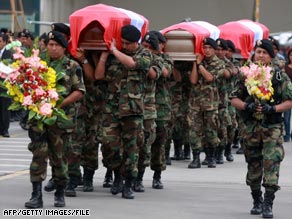Update (7:00pm):
In a brief ceremony held this morning, Sonia Sotomayor was sworn-in as the newest U.S. Supreme Court justice. Sotomayor pledged to the Constitutional Oath and the Judicial Oath; the latter of which was televised live for the first time:Visit msnbc.com for Breaking News, World News, and News about the Economy
Sotomayor thus becomes the third woman and first person of Latino background to be a judge on the U.S.' top tribunal. Though she has spent over seventeen years as a federal judge, she will be the second-youngest current Supreme Court justice at the age of 55.
Sotomayor replaces David Souter and is not expected to disrupt the balance of five conservative and four liberal judges. She will have plenty of cases to analyze when the new term starts on October 5th and she will be present at a unique set of hearings next month:
Her first test will come Sept. 9, when the justices hear an unusual second round of arguments in a campaign finance case to consider overturning the century-old ban on corporate political giving. The case concerns a documentary film critical of Secretary of State Hillary Clinton, then a candidate for the 2008 Democratic presidential nomination.Sotomayor has been assailed by her critics since being nominated to the Supreme Court in May including labeling her as a "racist" and focusing on her infamous "wise Latina" remarks. One conservative commentator implied that she could spell doom for the Obama administration should she show "a clear liberal philosophy" on the high court.
Later in its 2009-10 term, which formally starts in October, the court will consider the ability of private citizens to sue over religious monuments on public property, determine the constitutionality of a government agency that oversees the accounting industry and consider whether youths can be sentenced to life in prison for crimes other than murder.
Original Post:
Sonia Sotomayor will be sworn-in soon as the first Latina, third woman, and 111th U.S. Supreme Court justice. We'll have more details later, but in the meantime you can check out the historical swearing-in ceremony via MSNBC. (Update: Streaming video feed removed).Online Sources - MSNBC, CNN














